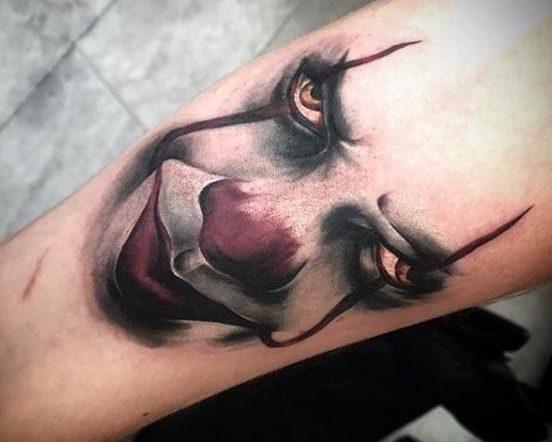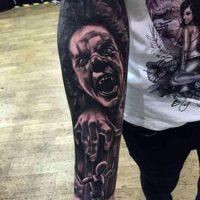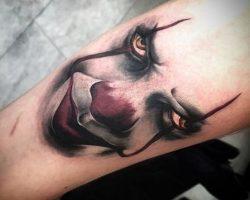
The meaning of a clown tattoo
Contents:
Clown tattoos represent a unique movement in the world of tattoo art, mixing vibrant imagery with deep symbolic meanings. The clown as a character has many interpretations in different cultures and eras, which makes his image very attractive to people looking for special symbolism in their tattoo.
In different cultures, the clown can symbolize different aspects of human nature: from joy and fun to a tragic mask hiding deep emotions. His image can reflect both the bright and dark sides of life, creating a multifaceted and contradictory image.
The popularity of clown tattoos is due to their unique ability to evoke emotions and convey complex ideas through the image. Additionally, the variety of styles and interpretations of the clown image make it an attractive subject for a variety of tattoo designs.

History of clown tattoos
Images of clowns in tattoos have a long history, finding their place in various cultures and eras. The history of clown tattoos dates back to ancient times, when tattoos were used to signify status, religious beliefs, and protection from evil spirits.
In religious and cultural contexts, the clown could be presented as a symbol of joy, humor and celebration, as well as a protector against harm and disease. In some cultures, the clown was considered a mediator between the world of the living and the world of spirits, with the ability to make requests and prayers to higher powers.
In different cultures, the clown could play different roles: from a simple entertainer to a sacred performer of rituals. In ancient Greek mythology, for example, the clown could symbolize spiritual awakening or be contrasted with the tragic hero, reflecting lightness and playfulness versus suffering and seriousness.
In the modern world, tattoos with images of clowns are most often associated with circus performers and entertainers, as well as with the symbolism of hip-hop culture and street art. The clown image has become a popular subject for tattoos due to its brightness, expressiveness and the possibility of interpretation in various styles and areas of tattoo art.

Symbolism of clown tattoos
Clowns, as a symbol, carry varied meanings and associations in different cultures and contexts. Here are a few key points:
- Humor and joy: In Western culture, clowns are often associated with humor, fun and entertainment. They are characters in a circus performance, filling the atmosphere with joy and positivity. Such tattoos can symbolize optimism, childish naivety and joy of life.
- Mysticism and fear: however, clowns can also evoke mysticism, mystery and fear. This is due to the fact that clowns are often depicted with bright makeup and unusual costumes, which can create the effect of incomprehensibility and even threat. Such tattoos can express a sense of mystery, unusualness, or even darker aspects of one's personality.
- Individuality and nonconformity: in some cases, clown tattoos can symbolize individuality and nonconformity. Clowns often act as an "alter ego" for people, allowing them to express parts of themselves that may be hidden or suppressed in everyday life.
- Cultural aspects: In different cultures, the symbolism of clowns can have different meanings. For example, in American culture clowns are often associated with circus performances, while in some other cultures clowns may be associated with religious or mystical rituals.
Thus, clown tattoos can carry a variety of symbolic meanings, reflecting different aspects of human nature and cultural characteristics.

Clown Tattoo Designs
Clown tattoo designs offer a huge variety of styles and approaches, from classic circus clowns to more modern and abstract interpretations. Here are some of the most popular and interesting options:
- Classic circus clown: This design often includes heavy makeup, a colorful suit with large buttons and wide pants, and large shoes. These tattoos can be made in bright colors and stylized in animation or comic book style.
- Realistic Clown: this style presents the clown in a more realistic way, with more natural makeup and costume. Such tattoos can be more detailed and expressive, conveying the emotions and character of the character.
- Gloomy or scary clown: this design plays on fear and mysticism, presenting the clown in a threatening or sinister light. Such tattoos can be done in dark colors with accents on makeup and facial expressions to create the effect of tension and anxiety.
- Clown accessories: Clowns are often associated with various accessories such as balloons, flowers, hats and scarves. These elements can be used in clown tattoos to create additional context or symbolic meaning.
- Combination with other elements: Clown tattoos can be combined with other elements and symbols to create more complex and interesting designs. For example, a clown may be depicted surrounded by circus paraphernalia such as a tent or animals, or combined with other dark or mystical symbols to enhance the effect.
As such, clown tattoo designs can be very varied and expressive, allowing each wearer to choose a style that best reflects their own personality and taste.
Meaning and interpretation for the owner
Impact on self-perception and lifestyle
A clown tattoo can have a profound impact on a person's sense of self and lifestyle. For some people, it can become a symbol of humor, playfulness and joy, reminding them not to take life too seriously and to enjoy the moment. For others, it can be a reminder that there is always room for a smile in life, even in difficult times. However, for some people, a clown tattoo can symbolize hidden fears, mysticism or even dark aspects of their personality, causing reflections on their own nature and internal conflicts.
Реальные истории
There are many real stories of people for whom a clown tattoo had special meaning. For example, some people choose these tattoos as tributes to clowns who inspired them as children or left a lasting mark on their lives. For others, a clown tattoo can be a way to express their personality and sense of humor, making their style unique and memorable. Additionally, there are stories of people whose clown tattoos have helped them overcome fears or dark periods in their lives, becoming a symbol of their strength and self-confidence.
Thus, a clown tattoo can have a different meaning for each wearer, reflecting their unique experiences, character and attitude towards life.
Popularity and cultural influence
The clown tattoo remains popular in modern culture for several reasons.
- Emotional Depth: Clowns can represent a wide range of emotions, from joy and fun to melancholy and sadness. This versatility makes them attractive to people who want to express complex feelings through a tattoo.
- Elements of mysticism and fear: For some people, clowns represent something mysterious and even scary, which makes their tattoos attractive to those who value mysticism and unusualness.
- Individuality and nonconformity: A clown tattoo can serve as an expression of individuality and non-conformity, allowing the wearer to stand out from the crowd and express their uniqueness.
- Cultural heritage: Clowns have a rich cultural heritage associated with theater, circus and other art forms. This makes their tattoos interesting as symbols of history and culture.
- Popular designs: With a variety of styles and designs, clown tattoos can be done in a variety of styles, making them appealing to people with different tastes and preferences.
The symbolism of the clown is reflected in various areas of culture
- Art: Clowns are often depicted in painting, sculpture and other art forms as symbols of various emotions and aspects of human nature.
- References: In literature, clowns often appear as characters reflecting the tragic or comic aspects of life, as well as symbols of heartache and sincere laughter.
- Cinema and Theater: Clowns are widely represented in film and theater as characters symbolizing various aspects of human nature and society.
Thus, the clown tattoo remains popular in modern culture due to its versatility and interpretability, as well as its unique cultural heritage and significance.
Where do you most often get a clown tattoo?
Clown tattoos are most often placed on the following parts of the body:
- Arm: Clown tattoos on the arm are quite popular due to their visibility and the ability to easily hide if necessary. In addition, the hand provides enough space for detailed images.
- Leg: On the leg, a clown tattoo can be large in size and detailed, making this body part a popular choice for such designs.
- Breast: A clown tattoo on the chest can be symbolic and have deep personal meaning for the wearer.
- Back: The back provides a lot of space for tattoos, so you can create a large and impressive image of a clown here.
- Shoulder: Clown shoulder tattoos are also popular, especially among those who prefer hidden tattoo locations or want to create a dynamic design that can be extended to other parts of the body.
Conclusion
The clown tattoo is a unique and multi-faceted symbol that continues to inspire and captivate people in getting tattooed. Its popularity is due to the variety of emotions and associations it carries, as well as its ability to be interpreted in different cultures and contexts.
The clown can symbolize joy and fun, but also mysticism and fear, making it attractive to those who appreciate complex and profound symbols. Clown tattoos can come in a variety of styles and designs, allowing everyone to find their own unique look.
The symbolism of the clown is reflected in various areas of culture, such as art, literature and cinema, which emphasizes its significance and influence on human psychology and perception of the world.
Thus, the clown tattoo remains relevant and in demand in modern culture, continuing to inspire people to create unique and expressive tattoos.
https://youtu.be/hU3QYlupKa8
























Leave a Reply